Campus/People
-
 Professor Alice Haeyun Oh to Join GPAI Expert Group
Professor Alice Haeyun Oh will participate in the Global Partnership on Artificial Intelligence (GPAI), an international and multi-stakeholder initiative hosted by the OECD to guide the responsible development and use of AI. In collaboration with partners and international organizations, GPAI will bring together leading experts from industry, civil society, government, and academia.
The Korean Ministry of Science and ICT (MSIT) officially announced that South Korea will take part in GPAI as one of the 15 founding members that include Canada, France, Japan, and the United States.
Professor Oh has been appointed as a new member of the Responsible AI Committee, one of the four committees that GPAI established along with the Data Governance Committee, Future of Work Committee, and Innovation and Commercialization Committee.
(END)
2020.06.22 View 8799
Professor Alice Haeyun Oh to Join GPAI Expert Group
Professor Alice Haeyun Oh will participate in the Global Partnership on Artificial Intelligence (GPAI), an international and multi-stakeholder initiative hosted by the OECD to guide the responsible development and use of AI. In collaboration with partners and international organizations, GPAI will bring together leading experts from industry, civil society, government, and academia.
The Korean Ministry of Science and ICT (MSIT) officially announced that South Korea will take part in GPAI as one of the 15 founding members that include Canada, France, Japan, and the United States.
Professor Oh has been appointed as a new member of the Responsible AI Committee, one of the four committees that GPAI established along with the Data Governance Committee, Future of Work Committee, and Innovation and Commercialization Committee.
(END)
2020.06.22 View 8799 -
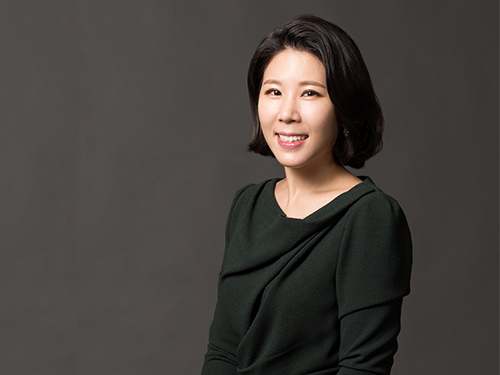 Research on the Million Follower Fallacy Receives the Test of Time Award
Professor Meeyoung Cha’s research investigating the correlation between the number of followers on social media and its influence was re-highlighted after 10 years of publication of the paper.
Saying that her research is still as relevant today as the day it was published 10 years ago, the Association for the Advancement of Artificial Intelligence (AAAI) presented Professor Cha from the School of Computing with the Test of Time Award during the 14th International Conference on Web and Social Media (ICWSM) held online June 8 through 11.
In her 2010 paper titled ‘Measuring User Influence in Twitter: The Million Follower Fallacy,’ Professor Cha proved that number of followers does not match the influential power. She investigated the data including 54,981,152 user accounts, 1,963,263,821 social links, and 1,755,925,520 Tweets, collected with 50 servers.
The research compares and illustrates the limitations of various methods used to measure the influence a user has on a social networking platform. These results provided new insights and interpretations to the influencer selection algorithm used to maximize the advertizing impact on big social networking platforms.
The research also looked at how long an influential user was active for, and whether the user could freely cross the borders between fields and be influential on different topics as well. By analyzing cases of who becomes an influencer when new events occur, it was shown that a person could quickly become an influencer using several key tactics, unlike what was previously claimed by the ‘accidental influential theory’.
Professor Cha explained, “At the time, data from social networking platforms did not receive much attention in computer science, but I remember those all-nighters I pulled to work on this project, fascinated by the fact that internet data could be used to solve difficult social science problems. I feel so grateful that my research has been endeared for such a long time.”
Professor Cha received both her undergraduate and graduate degrees from KAIST, and conducted this research during her postdoctoral course at the Max Planck Institute in Germany. She now also serves as a chief investigator of a data science group at the Institute for Basic Science (IBS).
(END)
2020.06.22 View 7633
Research on the Million Follower Fallacy Receives the Test of Time Award
Professor Meeyoung Cha’s research investigating the correlation between the number of followers on social media and its influence was re-highlighted after 10 years of publication of the paper.
Saying that her research is still as relevant today as the day it was published 10 years ago, the Association for the Advancement of Artificial Intelligence (AAAI) presented Professor Cha from the School of Computing with the Test of Time Award during the 14th International Conference on Web and Social Media (ICWSM) held online June 8 through 11.
In her 2010 paper titled ‘Measuring User Influence in Twitter: The Million Follower Fallacy,’ Professor Cha proved that number of followers does not match the influential power. She investigated the data including 54,981,152 user accounts, 1,963,263,821 social links, and 1,755,925,520 Tweets, collected with 50 servers.
The research compares and illustrates the limitations of various methods used to measure the influence a user has on a social networking platform. These results provided new insights and interpretations to the influencer selection algorithm used to maximize the advertizing impact on big social networking platforms.
The research also looked at how long an influential user was active for, and whether the user could freely cross the borders between fields and be influential on different topics as well. By analyzing cases of who becomes an influencer when new events occur, it was shown that a person could quickly become an influencer using several key tactics, unlike what was previously claimed by the ‘accidental influential theory’.
Professor Cha explained, “At the time, data from social networking platforms did not receive much attention in computer science, but I remember those all-nighters I pulled to work on this project, fascinated by the fact that internet data could be used to solve difficult social science problems. I feel so grateful that my research has been endeared for such a long time.”
Professor Cha received both her undergraduate and graduate degrees from KAIST, and conducted this research during her postdoctoral course at the Max Planck Institute in Germany. She now also serves as a chief investigator of a data science group at the Institute for Basic Science (IBS).
(END)
2020.06.22 View 7633 -
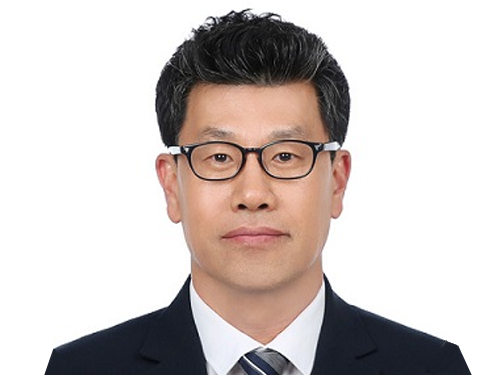 Professor Jee-Hwan Ryu Receives IEEE ICRA 2020 Outstanding Reviewer Award
Professor Jee-Hwan Ryu from the Department of Civil and Environmental Engineering was selected as this year’s winner of the Outstanding Reviewer Award presented by the Institute of Electrical and Electronics Engineers International Conference on Robotics and Automation (IEEE ICRA). The award ceremony took place on June 5 during the conference that is being held online May 31 through August 31 for three months.
The IEEE ICRA Outstanding Reviewer Award is given every year to the top reviewers who have provided constructive and high-quality thesis reviews, and contributed to improving the quality of papers published as results of the conference.
Professor Ryu was one of the four winners of this year’s award. He was selected from 9,425 candidates, which was approximately three times bigger than the candidate pool in previous years. He was strongly recommended by the editorial committee of the conference.
(END)
2020.06.10 View 9766
Professor Jee-Hwan Ryu Receives IEEE ICRA 2020 Outstanding Reviewer Award
Professor Jee-Hwan Ryu from the Department of Civil and Environmental Engineering was selected as this year’s winner of the Outstanding Reviewer Award presented by the Institute of Electrical and Electronics Engineers International Conference on Robotics and Automation (IEEE ICRA). The award ceremony took place on June 5 during the conference that is being held online May 31 through August 31 for three months.
The IEEE ICRA Outstanding Reviewer Award is given every year to the top reviewers who have provided constructive and high-quality thesis reviews, and contributed to improving the quality of papers published as results of the conference.
Professor Ryu was one of the four winners of this year’s award. He was selected from 9,425 candidates, which was approximately three times bigger than the candidate pool in previous years. He was strongly recommended by the editorial committee of the conference.
(END)
2020.06.10 View 9766 -
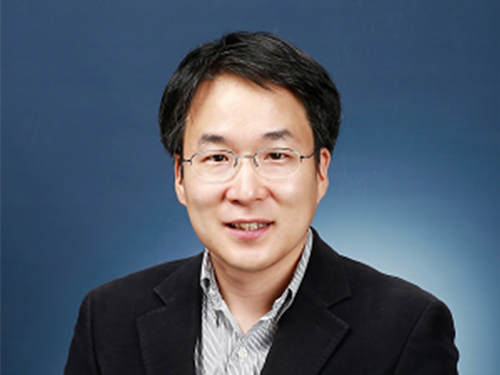 Professor Dongsu Han Named Program Chair for ACM CoNEXT 2020
Professor Dongsu Han from the School of Electrical Engineering has been appointed as the program chair for the 16th Association for Computing Machinery’s International Conference on emerging Networking EXperiments and Technologies (ACM CoNEXT 2020). Professor Han is the first program chair to be appointed from an Asian institution.
ACM CoNEXT is hosted by ACM SIGCOMM, ACM's Special Interest Group on Data Communications, which specializes in the field of communication and computer networks.
Professor Han will serve as program co-chair along with Professor Anja Feldmann from the Max Planck Institute for Informatics. Together, they have appointed 40 world-leading researchers as program committee members for this conference, including Professor Song Min Kim from KAIST School of Electrical Engineering.
Paper submissions for the conference can be made by the end of June, and the event itself is to take place from the 1st to 4th of December.
Conference Website: https://conferences2.sigcomm.org/co-next/2020/#!/home
(END)
2020.06.02 View 11027
Professor Dongsu Han Named Program Chair for ACM CoNEXT 2020
Professor Dongsu Han from the School of Electrical Engineering has been appointed as the program chair for the 16th Association for Computing Machinery’s International Conference on emerging Networking EXperiments and Technologies (ACM CoNEXT 2020). Professor Han is the first program chair to be appointed from an Asian institution.
ACM CoNEXT is hosted by ACM SIGCOMM, ACM's Special Interest Group on Data Communications, which specializes in the field of communication and computer networks.
Professor Han will serve as program co-chair along with Professor Anja Feldmann from the Max Planck Institute for Informatics. Together, they have appointed 40 world-leading researchers as program committee members for this conference, including Professor Song Min Kim from KAIST School of Electrical Engineering.
Paper submissions for the conference can be made by the end of June, and the event itself is to take place from the 1st to 4th of December.
Conference Website: https://conferences2.sigcomm.org/co-next/2020/#!/home
(END)
2020.06.02 View 11027 -
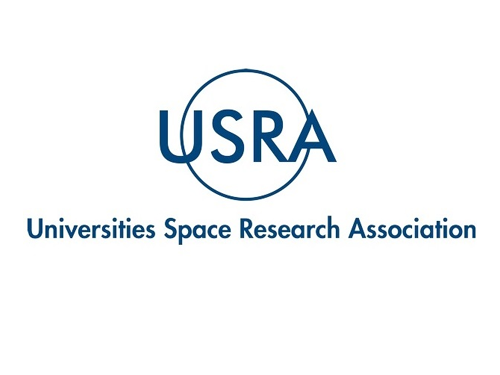 KAIST Elected to Universities Space Research Association Membership
KAIST joined the Universities Space Research Association (USRA) on May 4, and brought the Association to a total of 113 member universities. The expertise KAIST brings will broaden the Association’s collective strength in space-related science, technology, and engineering worldwide. Professor Hyosang Yoon from the Department of Aerospace Engineering will serve as the representative of KAIST to USRA.
KAIST was selected by USRA’s current university members, in recognition of its significant commitment in, and contributions to, the fields of space and aerospace research. Especially, KAIST have developed Korea's first satellite, KITSAT-1 in 1992, which paved the way for space research in Korea and helped the nation strengthen technological competitiveness in that field.
USRA was established in 1969 under the auspices of the National Academy of Sciences (NAS) of the United States. It is a non-profit corporation chartered to advance space-related science, technology, and engineering. USRA operates scientific institutes and facilities, and conducts other major research and educational programs, using federal funding. USRA also engages the university community and employs in-house scientific leadership, innovative research and development, and project management expertise.
USRA’s President and CEO Dr. Jeffrey A. Isaacson said in his announcement, “We are delighted to welcome these two renowned universities as members. We look forward to their active engagement with, and contributions to, our Association.” President Isaacson visited KAIST on December 10 last year to discuss possible collaborations between two organizations.
(END)
2020.05.29 View 7880
KAIST Elected to Universities Space Research Association Membership
KAIST joined the Universities Space Research Association (USRA) on May 4, and brought the Association to a total of 113 member universities. The expertise KAIST brings will broaden the Association’s collective strength in space-related science, technology, and engineering worldwide. Professor Hyosang Yoon from the Department of Aerospace Engineering will serve as the representative of KAIST to USRA.
KAIST was selected by USRA’s current university members, in recognition of its significant commitment in, and contributions to, the fields of space and aerospace research. Especially, KAIST have developed Korea's first satellite, KITSAT-1 in 1992, which paved the way for space research in Korea and helped the nation strengthen technological competitiveness in that field.
USRA was established in 1969 under the auspices of the National Academy of Sciences (NAS) of the United States. It is a non-profit corporation chartered to advance space-related science, technology, and engineering. USRA operates scientific institutes and facilities, and conducts other major research and educational programs, using federal funding. USRA also engages the university community and employs in-house scientific leadership, innovative research and development, and project management expertise.
USRA’s President and CEO Dr. Jeffrey A. Isaacson said in his announcement, “We are delighted to welcome these two renowned universities as members. We look forward to their active engagement with, and contributions to, our Association.” President Isaacson visited KAIST on December 10 last year to discuss possible collaborations between two organizations.
(END)
2020.05.29 View 7880 -
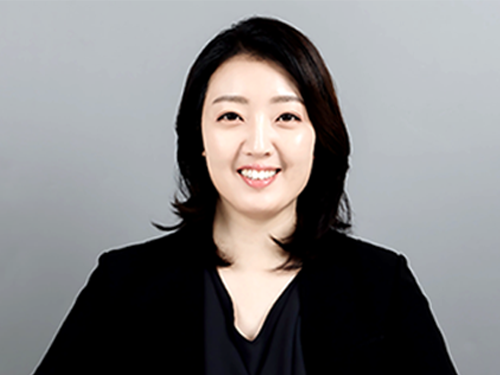 Professor Sue-Hyun Lee Listed Among WEF 2020 Young Scientists
Professor Sue-Hyun Lee from the Department of Bio and Brain Engineering joined the World Economic Forum (WEF)’s Young Scientists Community on May 26. The class of 2020 comprises 25 leading researchers from 14 countries across the world who are at the forefront of scientific problem-solving and social change. Professor Lee was the only Korean on this year’s roster.
The WEF created the Young Scientists Community in 2008 to engage leaders from the public and private sectors with science and the role it plays in society. The WEF selects rising-star academics, 40 and under, from various fields every year, and helps them become stronger ambassadors for science, especially in tackling pressing global challenges including cybersecurity, climate change, poverty, and pandemics.
Professor Lee is researching how memories are encoded, recalled, and updated, and how emotional processes affect human memory, in order to ultimately direct the development of therapeutic methods to treat mental disorders. She has made significant contributions to resolving ongoing debates over the maintenance and changes of memory traces in the brain.
In recognition of her research excellence, leadership, and commitment to serving society, the President and the Dean of the College of Engineering at KAIST nominated Professor Lee to the WEF’s Class of 2020 Young Scientists Selection Committee. The Committee also acknowledged Professor Lee’s achievements and potential for expanding the boundaries of knowledge and practical applications of science, and accepted her into the Community.
During her three-year membership in the Community, Professor Lee will be committed to participating in WEF-initiated activities and events related to promising therapeutic interventions for mental disorders and future directions of artificial intelligence.
Seven of this year’s WEF Young Scientists are from Asia, including Professor Lee, while eight are based in Europe. Six study in the Americas, two work in South Africa, and the remaining two in the Middle East. Fourteen, more than half, of the newly announced 25 Young Scientists are women.
(END)
2020.05.26 View 12779
Professor Sue-Hyun Lee Listed Among WEF 2020 Young Scientists
Professor Sue-Hyun Lee from the Department of Bio and Brain Engineering joined the World Economic Forum (WEF)’s Young Scientists Community on May 26. The class of 2020 comprises 25 leading researchers from 14 countries across the world who are at the forefront of scientific problem-solving and social change. Professor Lee was the only Korean on this year’s roster.
The WEF created the Young Scientists Community in 2008 to engage leaders from the public and private sectors with science and the role it plays in society. The WEF selects rising-star academics, 40 and under, from various fields every year, and helps them become stronger ambassadors for science, especially in tackling pressing global challenges including cybersecurity, climate change, poverty, and pandemics.
Professor Lee is researching how memories are encoded, recalled, and updated, and how emotional processes affect human memory, in order to ultimately direct the development of therapeutic methods to treat mental disorders. She has made significant contributions to resolving ongoing debates over the maintenance and changes of memory traces in the brain.
In recognition of her research excellence, leadership, and commitment to serving society, the President and the Dean of the College of Engineering at KAIST nominated Professor Lee to the WEF’s Class of 2020 Young Scientists Selection Committee. The Committee also acknowledged Professor Lee’s achievements and potential for expanding the boundaries of knowledge and practical applications of science, and accepted her into the Community.
During her three-year membership in the Community, Professor Lee will be committed to participating in WEF-initiated activities and events related to promising therapeutic interventions for mental disorders and future directions of artificial intelligence.
Seven of this year’s WEF Young Scientists are from Asia, including Professor Lee, while eight are based in Europe. Six study in the Americas, two work in South Africa, and the remaining two in the Middle East. Fourteen, more than half, of the newly announced 25 Young Scientists are women.
(END)
2020.05.26 View 12779 -
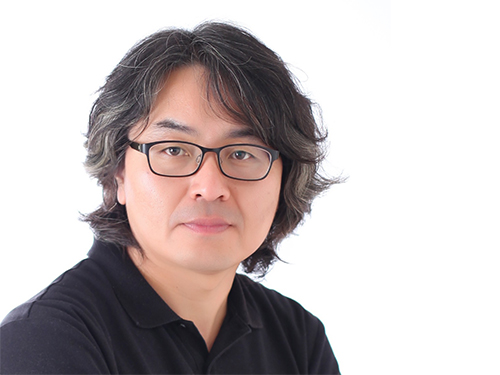 Professor Tek-jin Nam Elected to DSR Int’l Advisory Council
Professor Tek-jin Nam from the Department of Industrial Design was elected to serve on the first International Advisory Council (IAC) of the Design Research Society (DRS).
The DRS, an academic society in the field of design research, was founded in the UK in 1966 with the mission of developing and promoting design research. The IAC is newly established under the new DRS governance structure, and its members are selected from distinguished design researchers recommended by DRS members around the globe.
The new IAC members will carry out various activities offered by the DRS, which include innovating design research, strengthening the design researchers’ network and developing policies to nurture new researchers.
2020.05.22 View 6029
Professor Tek-jin Nam Elected to DSR Int’l Advisory Council
Professor Tek-jin Nam from the Department of Industrial Design was elected to serve on the first International Advisory Council (IAC) of the Design Research Society (DRS).
The DRS, an academic society in the field of design research, was founded in the UK in 1966 with the mission of developing and promoting design research. The IAC is newly established under the new DRS governance structure, and its members are selected from distinguished design researchers recommended by DRS members around the globe.
The new IAC members will carry out various activities offered by the DRS, which include innovating design research, strengthening the design researchers’ network and developing policies to nurture new researchers.
2020.05.22 View 6029 -
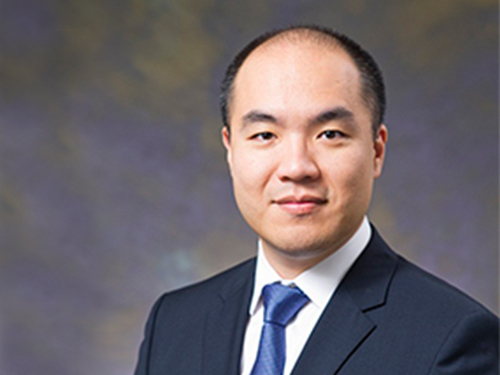 Professor Youngchul Kim Joins Presidential Commission on Architecture Policy
Professor Youngchul Kim from the Department of Civil and Environmental Engineering, who is also the Director of the Smart City Research Center at KAIST, was appointed as a commissioner of the 6th Presidential Commission on Architecture Policy on May 19. Professor Kim will contribute to coordinating and deliberating national architecture and urban development policies. He will serve a two-year term beginning this month.
The Presidential Commission on Architecture Policy is made up of 30 commissioners. Nineteen members, including Professor Kim, are experts from the private sector, and the rest include the Minister of Land, Infrastructure, and Transport, the Minister for Environment, and other government officials. The non-governmental commissioners represent a diverse mixture of genders, ages, and regions for the balanced development of the nation.
(END)
2020.05.21 View 7450
Professor Youngchul Kim Joins Presidential Commission on Architecture Policy
Professor Youngchul Kim from the Department of Civil and Environmental Engineering, who is also the Director of the Smart City Research Center at KAIST, was appointed as a commissioner of the 6th Presidential Commission on Architecture Policy on May 19. Professor Kim will contribute to coordinating and deliberating national architecture and urban development policies. He will serve a two-year term beginning this month.
The Presidential Commission on Architecture Policy is made up of 30 commissioners. Nineteen members, including Professor Kim, are experts from the private sector, and the rest include the Minister of Land, Infrastructure, and Transport, the Minister for Environment, and other government officials. The non-governmental commissioners represent a diverse mixture of genders, ages, and regions for the balanced development of the nation.
(END)
2020.05.21 View 7450 -
 Antivirus Industry the Centerpiece of New Deal R&D Initiatives
- KAIST launches post-COVID-19 R&D initiatives for smart mobile medical systems. -
KAIST will make the antivirus industry the centerpiece of what it is touting as the KAIST New Deal R&D initiative, which will drive new growth engines for preparing for the post-coronavirus era.
According to the new initiative, KAIST will concentrate on creating antivirus technologies, infectious disease-related big data management, and non-contact services platforms as key future R&D projects.
President Sung-Chul Shin launched the COVID-19 R&D Initiative task force last month, composed of more than 50 professors from the Graduate School of Medical Science and Engineering, the Department of Biological Sciences, the College of Engineering, and the Department of Industrial Design. The task force came up with key research agendas that will promote smart mobile medical systems in the years ahead.
“We will devote all of our R&D capacities to pursue a smart healthcare society,” said President Shin. “Our competitiveness in the fields of AI, ICT, materials, and bio-technology holds significant potential for building a healthy society powered by smart medical systems in Korea,” he added.
The smart medical systems focus mainly on building an Epidemic Mitigating Mobile Module (EMMM). The EMMM will manage epidemics via the three phases of prevention, emergency response, and treatment, with the development of each phase’s technological modules. The EMMM will also build an AI big data platform to assist with clinical applications and epidemic management.
Technologies applicable for the prevention phase include developing recyclable antivirus masks, plasma virus sterilizers, and smart breathable protective gowns. KAIST researchers will also focus on developing diagnosis modules that will identify epidemics more quickly and accurately.
Most significantly, KAIST aims to develop technologies for anti-infection medical services such as the transformable negative pressure ambulance module and negative pressure room, which are specially developed for respiratory infections.
The new R&D initiatives will center on virus therapies and treatments, specifically pushing forward vaccine and robotics studies. As caring robots and delivery robots will become common as main caregivers via noncontact services, research focusing on robotics will be significantly enhanced.
Even before launching the new R&D initiatives, researchers have started to present new technologies to help address the pandemic. Professor Il-Doo Kim’s team in the Department of Materials Science and Engineering developed a washable nano-fiber filtered face mask that is preparing for commercialization.
GPS tracking of infections has expanded comprehensively to detect both indoor and outdoor activities of infected patients. Professor Dong-Soo Han from the School of Computing developed Wi-Fi positioning software built into mobile phones that can trace both activities and is now preparing to roll it out.
Virologist Ui-Cheol Shin from the Graduate School of Medical Science and Engineering is carrying out research on a universal T-cell vaccine that can block the Betacoronaviruses. It is reported that that new epidemics such as SARS, MERS, and COVID-19 carry Betacoronaviruses.
Research teams in the Graduate School of AI are conducting various research projects on building prediction models for outbreaks and spreads using big data.
(END)
2020.05.20 View 13176
Antivirus Industry the Centerpiece of New Deal R&D Initiatives
- KAIST launches post-COVID-19 R&D initiatives for smart mobile medical systems. -
KAIST will make the antivirus industry the centerpiece of what it is touting as the KAIST New Deal R&D initiative, which will drive new growth engines for preparing for the post-coronavirus era.
According to the new initiative, KAIST will concentrate on creating antivirus technologies, infectious disease-related big data management, and non-contact services platforms as key future R&D projects.
President Sung-Chul Shin launched the COVID-19 R&D Initiative task force last month, composed of more than 50 professors from the Graduate School of Medical Science and Engineering, the Department of Biological Sciences, the College of Engineering, and the Department of Industrial Design. The task force came up with key research agendas that will promote smart mobile medical systems in the years ahead.
“We will devote all of our R&D capacities to pursue a smart healthcare society,” said President Shin. “Our competitiveness in the fields of AI, ICT, materials, and bio-technology holds significant potential for building a healthy society powered by smart medical systems in Korea,” he added.
The smart medical systems focus mainly on building an Epidemic Mitigating Mobile Module (EMMM). The EMMM will manage epidemics via the three phases of prevention, emergency response, and treatment, with the development of each phase’s technological modules. The EMMM will also build an AI big data platform to assist with clinical applications and epidemic management.
Technologies applicable for the prevention phase include developing recyclable antivirus masks, plasma virus sterilizers, and smart breathable protective gowns. KAIST researchers will also focus on developing diagnosis modules that will identify epidemics more quickly and accurately.
Most significantly, KAIST aims to develop technologies for anti-infection medical services such as the transformable negative pressure ambulance module and negative pressure room, which are specially developed for respiratory infections.
The new R&D initiatives will center on virus therapies and treatments, specifically pushing forward vaccine and robotics studies. As caring robots and delivery robots will become common as main caregivers via noncontact services, research focusing on robotics will be significantly enhanced.
Even before launching the new R&D initiatives, researchers have started to present new technologies to help address the pandemic. Professor Il-Doo Kim’s team in the Department of Materials Science and Engineering developed a washable nano-fiber filtered face mask that is preparing for commercialization.
GPS tracking of infections has expanded comprehensively to detect both indoor and outdoor activities of infected patients. Professor Dong-Soo Han from the School of Computing developed Wi-Fi positioning software built into mobile phones that can trace both activities and is now preparing to roll it out.
Virologist Ui-Cheol Shin from the Graduate School of Medical Science and Engineering is carrying out research on a universal T-cell vaccine that can block the Betacoronaviruses. It is reported that that new epidemics such as SARS, MERS, and COVID-19 carry Betacoronaviruses.
Research teams in the Graduate School of AI are conducting various research projects on building prediction models for outbreaks and spreads using big data.
(END)
2020.05.20 View 13176 -
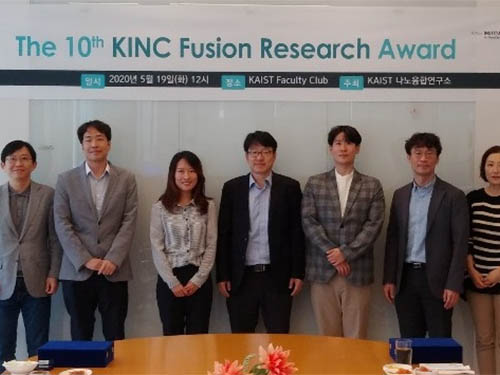 The 10th KINC Fusion Research Awardees
The KAIST Institute for NanoCentury (KINC) recognized three distinguished researchers whose convergence studies made significant impacts. The KINC presented the 10th KINC Fusion Research Awards during a ceremony that took place at KAIST’s main campus in Daejeon on May 19.
This year’s ‘best’ convergence research award went to a joint research group led by Professor Hee Tak Kim from the Department of Chemical and Biomolecular Engineering and Professor Sang Ouk Kim from the Department of Materials Science and Engineering. Their research, featured in the December 27 issue of Advanced Materials as a front cover article last year, introduced the world’s first high-energy efficiency, membraneless, flowless, zinc-bromine battery. This study, in which research professor Gyoung Hwa Jeong, postdoctoral researcher Yearin Byun, and PhD candidate Ju-Hyuck Lee took part as co-lead authors, is deemed as an example of a best practice in convergence research in which two groups’ respective expertise in the fields of carbon materials and electrochemical analysis created a synergistic effect.
Professor Bumjoon Kim from the Department of Chemical and Biomolecular Engineering was also recognized for having published the most interdisciplinary research papers on polymer electronics and nanomaterials at home and abroad.
Professor Hee-Tae Jung, the Director of KINC and the host of the KINC Fusion Research Awards, said, “The KINC is happy to announce the 10th awardees in nano-fusion research this year. Since convergence is crucial for making revolutionary changes, the importance of convergence studies should be recognized. Our institute will spare no effort to create a research environment suitable for convergence studies, which will be crucial for making a significant difference.”
The KINC was established in June 2006 under the KAIST Institute with the mission of facilitating convergence studies by tearing down boarders among departments and carrying out interdisciplinary joint research. Currently, the institute is comprised of approximately 90 professors from 13 departments. It aims to become a hub of university institutes for nano-fusion research.
(END)
2020.05.19 View 14565
The 10th KINC Fusion Research Awardees
The KAIST Institute for NanoCentury (KINC) recognized three distinguished researchers whose convergence studies made significant impacts. The KINC presented the 10th KINC Fusion Research Awards during a ceremony that took place at KAIST’s main campus in Daejeon on May 19.
This year’s ‘best’ convergence research award went to a joint research group led by Professor Hee Tak Kim from the Department of Chemical and Biomolecular Engineering and Professor Sang Ouk Kim from the Department of Materials Science and Engineering. Their research, featured in the December 27 issue of Advanced Materials as a front cover article last year, introduced the world’s first high-energy efficiency, membraneless, flowless, zinc-bromine battery. This study, in which research professor Gyoung Hwa Jeong, postdoctoral researcher Yearin Byun, and PhD candidate Ju-Hyuck Lee took part as co-lead authors, is deemed as an example of a best practice in convergence research in which two groups’ respective expertise in the fields of carbon materials and electrochemical analysis created a synergistic effect.
Professor Bumjoon Kim from the Department of Chemical and Biomolecular Engineering was also recognized for having published the most interdisciplinary research papers on polymer electronics and nanomaterials at home and abroad.
Professor Hee-Tae Jung, the Director of KINC and the host of the KINC Fusion Research Awards, said, “The KINC is happy to announce the 10th awardees in nano-fusion research this year. Since convergence is crucial for making revolutionary changes, the importance of convergence studies should be recognized. Our institute will spare no effort to create a research environment suitable for convergence studies, which will be crucial for making a significant difference.”
The KINC was established in June 2006 under the KAIST Institute with the mission of facilitating convergence studies by tearing down boarders among departments and carrying out interdisciplinary joint research. Currently, the institute is comprised of approximately 90 professors from 13 departments. It aims to become a hub of university institutes for nano-fusion research.
(END)
2020.05.19 View 14565 -
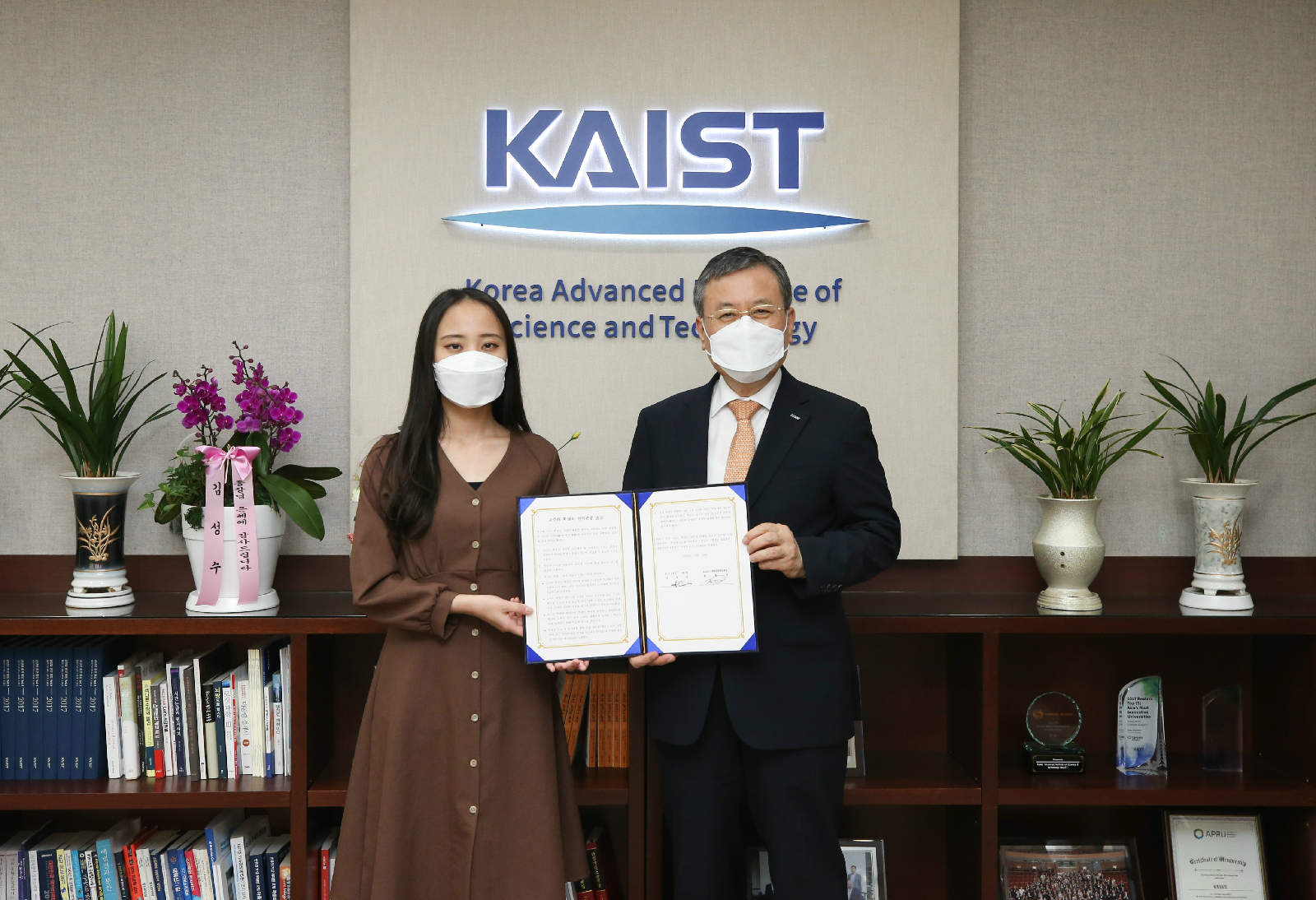 New Charter of Respect and Loyalty between Professors and Graduate Students
KAIST established a ‘Charter of Respect and Loyalty between Professors and Graduate Students’. This new charter states measures to build trust between professors and graduate students, and improve the working conditions of graduate students.
KAIST President Sung-Chul Shin and President of the KAIST Graduate Student Association (GSA) Hye-Jeong Han signed the charter as representatives of the professors and graduate students on May 18.
KAIST has become the first university in Korea to officially proclaim a promise between the school and the student council for the betterment of conditions for graduate students, and the first to specifically guarantee full-time graduate students’ vacations.
Graduate students have a unique status as both students receiving education and employees performing lab research. The GSA explained that “however, in reality, this unique status places them in a blind spot where they are not being fully entitled to their rights neither as employees nor students.”
The newly established charter is a set of promises made between professors and graduate students to uphold the values of respect and loyalty, and to establish trust in each other. Professors should treat each student not only as someone they should teach thoroughly, but also as a human being who should be respected. The graduate student should also respect the professor, and diligently perform their educational and research duties.
The charter also includes provisions stating that professors should provide minimum grants for the encouragement of research and education to the graduate students transparently and reasonably. In addition, professors must define a fixed number of hours that graduates students have to participate in education and research projects, and guarantee vacation leave for graduate students. Degree and graduation requirements should be clearly defined, and graduate students should devote themselves to education and research, and adhere to research ethics and safety measures.
(END)
2020.05.18 View 5113
New Charter of Respect and Loyalty between Professors and Graduate Students
KAIST established a ‘Charter of Respect and Loyalty between Professors and Graduate Students’. This new charter states measures to build trust between professors and graduate students, and improve the working conditions of graduate students.
KAIST President Sung-Chul Shin and President of the KAIST Graduate Student Association (GSA) Hye-Jeong Han signed the charter as representatives of the professors and graduate students on May 18.
KAIST has become the first university in Korea to officially proclaim a promise between the school and the student council for the betterment of conditions for graduate students, and the first to specifically guarantee full-time graduate students’ vacations.
Graduate students have a unique status as both students receiving education and employees performing lab research. The GSA explained that “however, in reality, this unique status places them in a blind spot where they are not being fully entitled to their rights neither as employees nor students.”
The newly established charter is a set of promises made between professors and graduate students to uphold the values of respect and loyalty, and to establish trust in each other. Professors should treat each student not only as someone they should teach thoroughly, but also as a human being who should be respected. The graduate student should also respect the professor, and diligently perform their educational and research duties.
The charter also includes provisions stating that professors should provide minimum grants for the encouragement of research and education to the graduate students transparently and reasonably. In addition, professors must define a fixed number of hours that graduates students have to participate in education and research projects, and guarantee vacation leave for graduate students. Degree and graduation requirements should be clearly defined, and graduate students should devote themselves to education and research, and adhere to research ethics and safety measures.
(END)
2020.05.18 View 5113 -
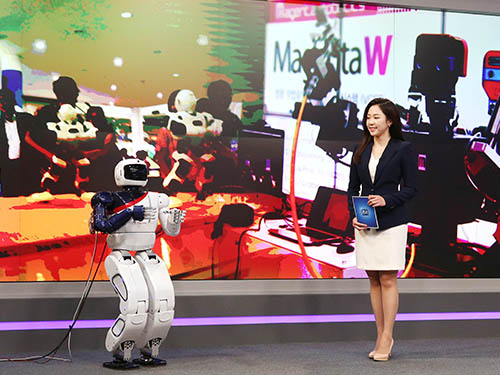 Hubo Debuts as a News Anchor
HUBO, a humanoid robot developed by Professor Jun-Ho Oh’s team, made its debut as a co-anchor during the TJB prime time news 8 on May 14.
“Un-contact" became the new normal after Covid-19 and many business solutions are being transformed using robotics. HUBO made two news reports on contactless services using robots in medical, manufacturing, and logistics industries. HUBO 2, the second generation of HUBO, appeared as a special anchor on the local broadcasting network’s special program in celebration of its 25th anniversary.
HUBO is the champion of the 2015 DARPA Robotics Challenge held in the USA. Its FX-2 riding robot also participated in the Olympic torch relay during the 2018 PyeongChang Winter Olympics.
Click here to watch a full video of HUBO anchoring the news.
(END)
2020.05.14 View 12667
Hubo Debuts as a News Anchor
HUBO, a humanoid robot developed by Professor Jun-Ho Oh’s team, made its debut as a co-anchor during the TJB prime time news 8 on May 14.
“Un-contact" became the new normal after Covid-19 and many business solutions are being transformed using robotics. HUBO made two news reports on contactless services using robots in medical, manufacturing, and logistics industries. HUBO 2, the second generation of HUBO, appeared as a special anchor on the local broadcasting network’s special program in celebration of its 25th anniversary.
HUBO is the champion of the 2015 DARPA Robotics Challenge held in the USA. Its FX-2 riding robot also participated in the Olympic torch relay during the 2018 PyeongChang Winter Olympics.
Click here to watch a full video of HUBO anchoring the news.
(END)
2020.05.14 View 12667